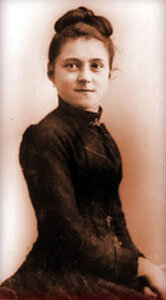Breaking Open the Word - 32nd Sunday of Ordinary Time, Year A
32nd Sunday in Ordinary Time, Year A – November 8th, 2020
We had a beautiful Scripture Sharing this week, as all were enriched by hearing our Sisters’ insights into the parable of the Ten Virgins! One Sister opened our discussion by connecting the lamps in the story to our Passionist charism. Just as the five wise virgins kept their lamps burning brightly, so we must do the same in cultivating the great gift of our spiritual patrimony. Continuing the metaphor, what then would the oil represent? Sister noted that olive oil (the type of oil most likely used in first-century Palestine) is produced by crushing the olives in a press – in Aramaic, a gethsemane. Thus, the “lamp” of our charism must be fed by imitating Our Lord in the Garden of Gethsemane, embracing the Father’s Will with love and fidelity. At times it may feel as if we’re being “crushed” as our selfishness and sins are challenged, but like the pressed olive, we in our patient suffering can bring forth rich nourishment for our spiritual lives.
Another point of discussion was the fact that all of the virgins, foolish and wise alike, fell asleep while waiting for the Bridegroom. If the wise virgins were not able to “stay awake,” as Jesus exhorts us at the end of the parable, why are they still held up as a model? One Sister responded by quoting the Song of Songs: “I sleep, but my heart wakes.” (Song 5:2) If we have a supply of “oil” to keep our lamp of love and fidelity burning, than we can truly say that our heart remains with the Beloved even in times of spiritual “night.” Once we have faithfully supplied what little we can to feed our lamp, then we can “sleep” with confidence that our Father will provide for us in the midst of our weakness.
“We can never have too much confidence in the good God!” — St. Therese of Lisieux
We also considered what might have happened if the foolish virgins had reacted differently upon discovering their predicament. What if, instead of leaving to wake some merchants at midnight so they could buy oil, they had simply thrown themselves on the mercy of the Bridegroom? According to St. Therese of Lisieux, such a reaction is precisely the right way to approach God after we have sinned. Our natural tendency is to turn inward, to avoid God out of shame, and to try to fix the problem ourselves (to go out and buy oil!). But God is waiting to help us if only we will turn to Him with contrite and trusting hearts! We should have no fear in coming before Him “with empty hands,” as St. Therese famously said.
Finally, we spoke about this parable’s lesson of vigilance and fidelity even when the Lord seems “long delayed.” A Sister pointed out that it appears the lamps of both foolish and wise virgins had been burning all night, and it is only at midnight when the foolish discover that they are running out of oil. Perhaps they had not expected to be waiting so long, and that is why they neglected to bring an extra supply. This is often the case in our spiritual lives – one of the hardest things in following the Lord is to persevere in our “first love” (Rev. 2:4) when the “night” seems long and the Second Coming impossibly distant. If we neglect to feed our lamp of love with constant renewal in our dedication to Christ, we are in danger of seeing the flame of faith and expectation die out in our lives.
In fact, helping others to keep their “lamps” burning is a special aspect of the religious vocation. By our total dedication to the Kingdom of Heaven, we are to serve as witnesses to the Church and the world that this earth is not our ultimate home. Mother Church depends on her consecrated religious men and women to remind all to remain vigilant. After all, the Bridegroom says, “Behold, I come very soon!”
“Amen!” we reply. “Come, Lord Jesus!” (Rev. 22:20)


